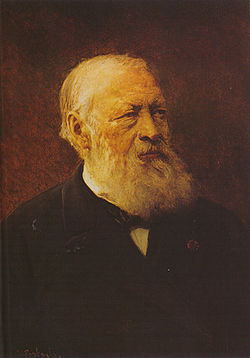Hendrik Conscience
Henri "Hendrik" Conscience (3 December 1812 Antwerp - 10 September 1883 Elsene) was a Belgian writer. His father was French and his mother was Flemish. He wrote in Dutch after the secession from the Netherlands in 1830 left Belgium a mostly French speaking country.
His mother died in 1820. The boy and his younger brother had no other friend than their grim and somewhat sinister father. In 1826 Pierre Conscience married again, this time to a widow much younger than himself, Anna Catherina Bogaerts. Soon after his second marriage Pierre sold his shop and moved to the Kempen region. Conscience often describes this land in his books. It is the flat land that stretches between Antwerp and Venlo.
At the age of seventeen Hendrik left his father's house to become a tutor in Antwerp. His studies were soon interrupted by the Revolution of 1830. He volunteered in the Belgian revolutionary army. In 1837 he left the service and returned to civilian life.
His poems, written while he was a soldier, were all in French. He received no pension when he was discharged. He decided to write a Flemish book for sale. He wrote a series of stories set during the Dutch Revolt, with the title In 't Wonderjaar 1566 (published Ghent, 1837).
His father thought it so vulgar of his son to write a book in Flemish that he turned him out of doors. Soon people of standing, amongst them the painter Wappers, showed interest in the unfortunate young man. Wappers even gave him a suit of clothes and eventually presented him to King Leopold. Leopold ordered the Wonderjaar to be added to the libraries of every Belgian school. It was with the patronage of Leopold I that Conscience published his second book, Fantasy, in the same year 1837.
The Lion of Flanders was followed by How to become a Painter (1843), What a Mother can Suffer (1843), Siska van Roosemael (1844), Lambrecht Hensmans (1847), Jacob van Artevelde (1849), and The Conscript (1850).
In 1845 Conscience was made a knight of the Order of Leopold. Writing in Flemish had stopped being seen as vulgar.
In 1845 Conscience published a History of Belgium on request by King Leopold I. Blind Rosa (1850), Rikketikketak (1851), The Decayed Gentleman (1851), and The Miser (1853) are among the most important of the long list of his novels. These had an instant effect upon more recent fiction, and Conscience had many imitators.
In 1855 translations of his books began to appear in English, French, German and Italian. He continued to make novels with great regularity. His publications amounted to nearly eighty in number. He was by now the most eminent of the citizens of Antwerp. His 70th birthday was celebrated with public festivities. After a long illness he died at his house in Antwerp. +{{{1}}}−{{{2}}}
Hendrik Conscience Media
A romanticized 1836 depiction of the Battle of the Golden Spurs by Nicaise de Keyser. Conscience's Lion of Flanders tapped into a popular interest in the battle
Statue of Conscience outside the Hendrik Conscience Heritage Library in Antwerp
References
| This article includes text from the public domain 1911 Encyclopaedia Britannica. Please add to the article as needed. |




